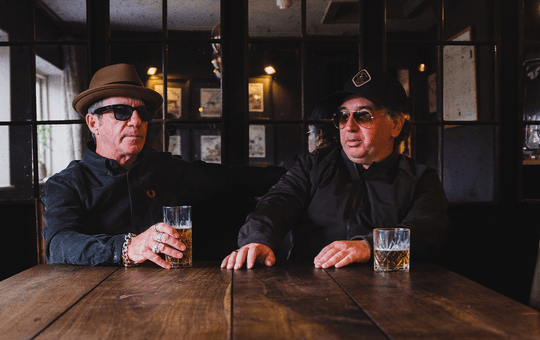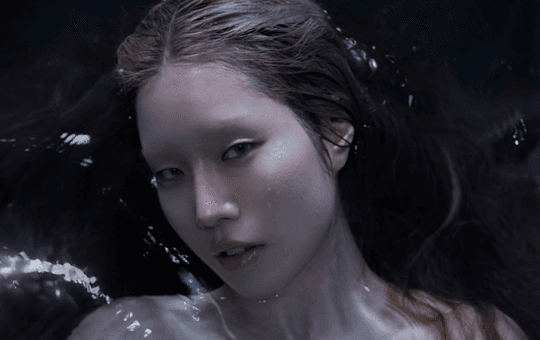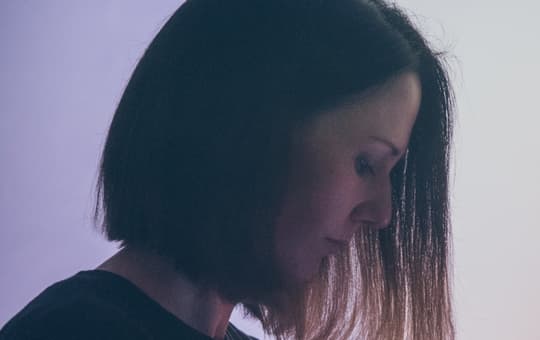Cloud Boat interview: "Kings of the swamp."
Sam Ricketts and Tom Clarke are nervous. It’s one day since they released their debut album under the name of Cloud Boat via R&S offshoot Apollo, and tonight they play at The Lexington in North London to mark the occasion. On ‘Book Of Hours’, the pair have drawn on years of experience playing as session musicians and support acts for Mount Kimbie and James Blake to create a post-post-dubstep sound that weaves folk, metal and electronic influences into something that sounds both reminiscent of its precursors and yet entirely unlike them.
When I meet them, they’re kicking their heels in the venue’s dressing room and waiting for soundcheck. “Tonight will probably be quite bad,” Ricketts says with a glance at Clarke, not meaning in terms of their performance, but in terms of how nervous his friend gets before they play to crowds of people they know. “Nerves often mean the best show though.”
If Ricketts is nervous himself, he doesn’t immediately give it away, lounging back in his chair and grinning broadly as he chats about the record. Clarke is more noticeably worried – his sentences have a way of shuddering to a close as he sinks into thought about them, before launching back into a whole new train of thought, and his hand gestures belie a slightly guarded, slightly anxious feeling. That’s where the closeness of the childhood friends comes through, though – Ricketts often leaps in to finish Clarke’s sentences when he’s trailing, while Clarke usually has a quietly considered zinger to punctuate his friend’s long ruminations.
As it turns out, you would never guess at this earlier stagefright from the presence the pair command onstage that evening. Cloud Boat have a very minimal live set-up: they sit on chairs throughout the set, Ricketts with his guitar and Tom singing and controlling all the loops and effects that define their abstracted-folk sound, each of them sat beside a full moon projection to give a ghostly effect. The intensity with which they play, though – Clarke’s voice in particular is one of the most moving and impressive I’ve seen/heard live this year – is undeniable.
As they try to forget about their nerves for an hour before the gig, we chat about singing Machinehead at school, recording footsteps in car parks and other unlikely sources for their astonishing sound.
I wanted to start chronologically and ask about where you grew up, and how you met.
S: Well we both grew up in Enfield in North London – you wouldn’t know it was London if you were there, it’s almost in Hertfordshire. We went to different schools and met when we were 15 or 16. And we played in a metal band together. That’s how we initially met, through loud scream-y music. I had long hair, it was bizarre.
T: And no beard.
S: No beard, long hair. Like my mum.
What was your metal band called?
T: I don’t know if we should say the name because there is stuff still on the internet. It’s very embarrassing..
S: Yeah, there’s not a lot but if people dug hard enough they could find it.
Did it get quite far then?
S: Not really, I think we played a lot locally, we used to put on shows in church halls and stuff, they were always really really busy, but in the grand scheme of things no one outside north London – EN 1 2 3 and 13 – knew who we were.
T: No one beyond Islington.
S: Yeah, everyone was really really young and really really drunk at every gig, even though we were underage. So yeah, it didn’t go far at all.
T: Good fun though.
S: Yeah, it was good fun.
“We used to practise on a Friday, go straight from school to practice, then get chips from the chip shop, then throw bricks at a guy’s shed.” – Tom Clarke, Cloud Boat
Was it the live aspect of it that drew you to that genre, the energy of the shows?
S: I’d only just started playing – I played bass then – but I didn’t really know or like the music.
T: [laughs] That’s nice.
S: I didn’t!
T: I think it was because we were all considerably uncool. Drastically uncool.
S: Yeah, we were like the coolest people on the uncool side.
T: We were kings of the swamp.
S: It’s still the same I think. But yeah, we all lived really close together, the drummer lived opposite me and Tom still only lives round the corner. So it was just something to do, really.
T: We used to practise on a Friday, go straight from school to practice, then get chips from the chip shop, then throw bricks at a guy’s shed.
S: I never threw bricks at the shed.
T: Well I did. And if that guy finds out, it’s alright. He’s a weedy man. He never caught us.
S: [laughing] Oh God!
T: The shed was in this alleyway behind one of my friends’ houses, and loads of kids used to go there to smoke and drink and throw toys around…
S: Some people camped there. Just in an alley behind some houses. There’s a gate on it now. I feel sorry for the young generation now.
T: It was good fun though.
S: It was good fun.
You guys had metal, the younger generation have sad, electronic music… Was that a natural progression for you from one to the other?
S: Not really, actually. I think when you’re very dedicated to guitar-based music there’s a preconception of dance music as like, people on drugs, and then like, trance music that you’d find in a video game or something, you never think there’s anything in between that. I really wish I had known that there was good stuff earlier, because I sort of, I started to listen to a lot of post-rock, and then the more ambient side of post-rock like Stars of the Lid and stuff like that, but I really wish I’d delved a bit deeper at an earlier age. But it was at uni where we both, like most people do, kind of discovered it.
T: I suppose I didn’t even really discover it at uni, I just sort of found out it was there, and dipped my toes, but it’s only now, still now, in the last year and a half, that I’ve started actively seeking out new forms of electronic music.
S: I was the guy at FWD and DMZ, not really moving, but really into it. We used to go out quite a lot. In my first year I became aware of people like Skream and Rusko who were playing tiny pubs in New Cross, so I feel quite lucky to have been part of it. There were seven or eight of us in the same house, and we used to go to FWD every week and DMZ whenever it was on, so I guess I was the opposite to Tom, in that sometimes I was not even drunk, I was just searching for the spot where the bass was loudest, just standing there looking down for like half an hour.
T: That’s not to imply that I was always drunk.
What’s your songwriting background? Are either of you trained in music or songwriting formally?
S: I studied classical music at uni, but I’ve never sung, so I think my approach to writing has always been about getting really into the melodies and textures – that’s probably why some of the structures are quite weird in some of our tracks.
T: And I’m probably the opposite of that, in that I’ve learnt instruments but I’ve never been formally trained in any way, so I see the other side, maybe the more immediate side of songs. I think we both look for different things in songs, which probably makes it work quite well…I’ve always just done everything by ear and instinct.
“The first time I sang at school was Year 11, when I sang a Machinehead song at like, a school soirée. It was awful, I sang with my back to the crowd.” – Tom Clarke, Cloud Boat
How did you learn to sing?
T: I dunno.
S: It must have been really uncool at your school.
T: What, singing?
S: Yeah.
T: No one knew – I didn’t sing at school. The first time I sang at school was Year 11, when I sang a Machinehead song at like, a school soirée. It was awful, I didn’t face the audience. I sang with my back to the crowd. It was really bad. I did a couple of choirs and stuff, but I never did any solos or anything like that. My mum used to play the piano, she was a teacher so she used to play piano for her assemblies and stuff, and I would sing songs to her playing the piano. And my dad, he’s not a professional singer, but he can sing. He’s a really good singer. I guess I picked up stuff from that, but never anything formal. And then I just decided to start playing open mic nights at uni. I never did anything big, but people always quite liked it. Just little bits, I dunno. I’ve always managed to kind of, do all right.
“One of the percussion sounds on Bastion is someone paying for parking in a multi-storey car park.” – Sam Ricketts, Cloud Boat
It’s funny what you said about singing with your back to the audience because I was thinking about the vocals on the album and how they’re one of the most emotive points, but they’re definitely not always at the forefront, it’s really more like one of many instruments. Is that the way you wanted to use it?
T: In music, I always look for the writer’s or the band’s sense of space or spatial arrangement, and I think when you first start writing songs it’s the usual tendency to kind of rush in and push everything in people’s face, whereas sometimes it’s most effective to make people find things. Sometimes the most obvious thing is in the background, and it’s most effective because you’ve got to go and grab that thing out of the song and bring it forward yourself, and I’ve always found that an amazing process.
S: It’s something I really like in classical music as well; when you have to actively listen to understand what it is about it that makes it work. Like music based around patterns, where your rhythmic perception of it is changing every time it comes around, things like that are really really interesting.
Are there some parts where you made it quite difficult to pick out the lyrics deliberately?
S: I guess – a lot of the parts that have re-pitched stuff are quite hard to make out.
T: There are a couple of bits that are like responses, like in Godhead there’s a really quiet response in the middle section, so there are some bits where some of it’s for me, some of it’s bits that I want to hear. And some of the lyrics are things that were written as whole poems or whole verses and we’ve just pulled fragments out of it, so it still sounds sentimental and like it’s divulging something, a specific experience, but the listener won’t necessarily know what it is, but they can maybe relate to it in a different way.
S: What’s nice is that we know every note and aspect and where it’s come from on that record. We know what all the words are, but everyone else listening to it finds out gradually. It’s like, knowing one of the percussion sounds on Bastion is someone paying for parking in a multi-storey car park. It’s like, we know that –
T: And a woman dragging her heels –
S: Yeah, we just sat there with a mic on a bench. The snares are a guy collecting trolleys and putting them away.
Was that just for that one track?
S: Yeah, yeah and we spent ages field recording for it. People must have thought we were mental, because it wasn’t on a little recorder, it was like, laptop, interface, SR58… There were just these really big clatter-y trolley noises, and we just put a big sub on it. But it’s nice that audiences will not know that that’s where it came from.
Cloud Boat – Youthern
When I reviewed your album I mentioned how spacious and skeletal it is, so do you take a lot of that collected sound back out once you’ve put it in?
S: I think we both like music where the ideas are very pure. Like, single string guitar melodies were always something I’ve really liked, so that’s probably something that’s reflected a bit. Definitely not too dense.
T: Yeah, recently one of the people who I’ve noticed that the most with is Grouper, a lot of the time you can’t hear what she’s saying, you don’t really have any idea what she’s doing, but the amount of emotion and sentiment she conveys in her songs is something that I’ve not really heard anywhere else before. I don’t know how she does it, and I don’t know what it is, but Heavy Water/I’d Rather Be Sleeping, that song stirs emotions in me that I’ve never – and I don’t know what she’s doing, and I have a limited understanding of what she’s saying, but what she does with it is just incredible. And pursuing that art is something that you could spend a lifetime doing.
Grouper – Heavy Water/I’d Rather Be Sleeping
I wanted to ask about the Book Of Hours concept – I know you said the album wasn’t conceptual but I read that it came from a trip to the British Library?
T: Yeah I suppose it was, I don’t know if you would call it a concept, but I went to the British Library and they have these Books of Hours, they’re kind of small books that people used to write confessions and prayers in, and you used to decorate them and once they were finished you would always keep it on your person. I like the idea of the album carrying that sentiment, the idea that it’s a collection of – for me, lyrics that are sometimes quite confessional and cathartic.
S: I think we’re both quite fascinated with religion. Liturgical things often have a weight to them that we both really like. And we both like going in churches and playing in churches. There’s an atmosphere to that, I mean, some people have compared parts of our track to being church-like and choral-like, which is something we never really implicitly tried, but I think we like hearing.
And speaking of names, where did Cloud Boat come from?
S: It came from when I was in my third year at uni – I used to go along to a lot of postgraduate doctorate seminar things, and I went to one about this Lithuanian painter/composer, I can’t pronounce his name because it’s really difficult [it’s Mikalojus Konstantinas Čiurlionis], but he used to write a sonata and then do a painting for each movement. And his music was really, really good. They passed around this book, and there was a painting that just said Cloud Boat underneath it, and I just thought about the way the two words don’t really mean anything when put together, and don’t relate to each other…the painting was all right [laughs], he was a better composer than a painter I think.
T: Don’t tell him.
“The emotion of the last track can often dictate how you feel towards the rest of it. If you see an album as a journey then where you end is the most important thing.” – Sam Ricketts, Cloud Boat
It seems like quite a whimsical name in contrast to quite serious music.
T: I think it has connotations of escape and adventure, and that’s what I’ve always liked about it.
S: It always gets to the point with your band name where after a couple of years you never really think about it. There’s really really big bands with awful names.
T: Pearl Jam.
S: Pearl Jam is a horrendous name.
T: Megadeth. Not even spelt right. Korn with a K, what’s that?
S: All amazing bands [laughs]. But yeah, it’s nice that it feels escapist, and that it doesn’t have “the” in it and it’s not a plural.
T: That was the premise of our band name, it can’t have “the” or be a plural. Like The Cloud Boat.
S: Or The Cloud Boats. Or Cloudy and the Boat!
Kowloon Bridge feels like a really hopeful note to end the album on, were you deliberately steering towards that?
S: It was one of the first songs we wrote, and I think we always knew it would be the last song on the album.
T: We always said that didn’t we? Because there’s such an overriding sense of darkness and sadness on the album.
S: If anything, we wanted to leave people knowing that we’re not sad people, ultimately we’re not that strange or depressed. The emotion of the last track can often dictate how you feel towards the rest of it. If you see an album as a journey then where you end is the most important thing, so it’s a nice way to have finished it.
R&S/Apollo released ‘Book Of Hours’ on the 27th May 2013.














